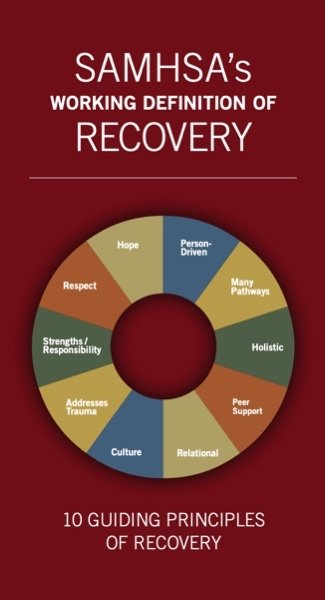Recovery Recources
Recovery is a term used in both mental health and alcohol/substance use. In mental health, it stands in contrast to an old medical model that sought to eliminate symptoms as a prerequisite of health. Instead, recovery is put forth as how one lives a full life, with or without symptoms of a mental illness.
Pat Deegan, an early leader of the recovery movement described recovery as follows:
Recovery is a process, a way of life, an attitude, and a way of approaching the day’s challenges. It is not a perfectly linear process. At times our course is erratic and we falter, slide back, regroup and start again. The need is to meet the challenge of disability and reestablish a new and valued sense of integrity and purpose within and beyond the limits of the disability; the aspiration is to live, work, and love in a community in which one makes a significant contribution. (p 9 in On Our Own)
Wellness Recovery Action Plans
Recovery Assessment Scale - Domains & Stages
SAMHSA Illness & Recovery Management EBP Kit
Occupation is really an old word for doing. Somehow we tend to think about work and while that is one kind of occupation, there are many others. Types of occupation include play/leisure, self care, sleep etc. This link is to a page that I plan to collect things to do for fun!
Recovery is defined by SAMHSA as:
A process of change through which individuals improve their health and wellness, live a self-directed life, and strive to reach their full potential.
SAMHSA lays out 4 dimensions to support recovery:
Health - managing physical and mental health symptoms
Home - having a safe & stable place to live
Purpose - meaningful occupation of time
Community - belonging & relationships
Principles are very important. They are core elements that systems and providers can use to hold themselves accountable. They also help individuals advocate for supports that live up to the ideal of recovery. Follow this link to learn more about recovery principles.
WRAP Plans are a tool for recovery. They help build a wellness toolbox, daily maintenance strategies, identify triggers, early warning signs and develop a crisis plan. There is a book by Mary Ellen Copeland, and/or you can access resources such as workbooks, courses and support through the Copeland Center website.
WRAP plans are often facilitated by peer support specialists and there are a number of blank templates and forms out on the internet. Here is a workbook offered by NAMI - Rockland:
This tool is out of Australia. It was created by occupational therapy faculty at the University of Sydney. It looks at 4 domains of recovery:
Doing things I value
Looking forward
Mastering my illness
Connecting and belonging
It is written in easy to understand language and begins with an assessment that lets you prioritize which domain is most important, so you can dive into what you need. It can be facilitated by a therapist or it may be used as a self help tool.
Once you take the assessment and figure out where you want to begin, you go to that section of the workbook and it has well written, easy to follow exercises to help you work through each domain. You may download just the section you need or the whole workbook with all 4 sections, and it is free!
This is another series of group formats for a series of groups supporting recovery. It has facilitator instructions as well as activity sheets but the language is a lot denser. Still it is a good series, and it is also free. If you are a mental health professional, you may have groups this would be a good series for. If you are looking for self help, it may be frustrating.


